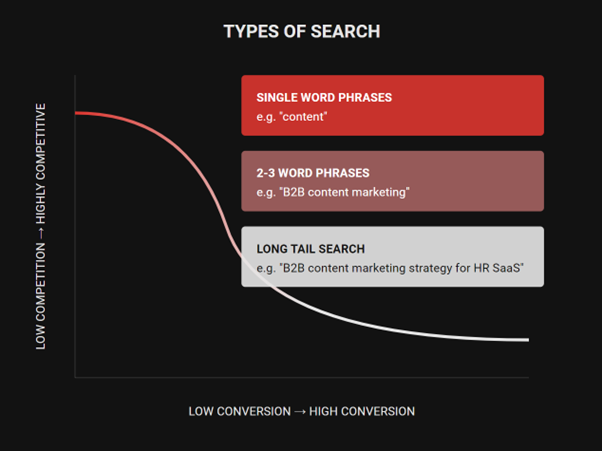The phrase “content is king” has never been more relevant. Widely adopted by B2B marketers, content marketing has become a key approach for attracting, engaging, and retaining audiences.
According to Will Davis, Chief Marketing Technology Officer at Right Source, “High-quality content should be a part of EVERY piece of marketing that you do. So that makes content marketing, by nature, a part of demand generation and lead generation. In short, good luck trying to generate demand or leads without high-quality content.” – Source
With LLMs giving everyone the ability to make massive amounts of content on a whim, this focus on quality content cannot be overstated.
High quality content is defined by its relevance to the reader.
Fortunately, at least for now, the Chatbots and Search Generative Experience only provide high level, generic answers in many cases. The opportunity to position your content as “High-quality” lies in your ability to identify and acutely address the problems of the audiences most relevant to your brand.
Topical depth and specificity will go a long way to building trust and authority. The growing “long-tail” way in which users research a topic/solution presents an opportunity to be rewarded for this low competition, high converting content.

92% of all keywords get 10 or fewer searches per month. People aren’t searching for keywords, they are searching for solutions.
“Focus your content efforts on solving the most important problems of your target audience and distributing it well and you will win. 90% of B2B buyers agreed that engaging with your content increases their trust. However, the challenges around distribution will be exacerbated by a glut of low effort AI content in the coming years. ”
Ross Howard, Product Marketing Director
Your focus should be on providing valuable, relevant, and consistent content that draws in a specific audience. But it’s not just about views—content marketing’s real strength is in converting those views into leads and guiding them toward becoming loyal customers. It’s about offering information that solves problems, satisfies curiosity, and builds lasting trust.
How content marketing fuels B2B demand generation success
Where B2B marketers are flooded with information, how can businesses ensure their message resonates and drives demand? Content marketing is the answer, transforming casual browsers into loyal customers.
In this blog, we’ll explore why content marketing is crucial for B2B success and outline the major benefits it offers to elevate your demand generation efforts, building stronger customer relationships and driving consistent growth.
1. Brand authority
Building brand authority is a key advantage of content marketing, positioning your business as a trusted expert. It’s not just about producing content; it’s about delivering the right content.
For example, well-researched articles that enhance your brand’s voice in the industry are a mainstay of content marketing. However these are not the only way you can deliver content and not all prospects consume it the same way.
Start with a content strategy that positions your brand (or experts aligned to your brand) as thought leaders by claiming a consistent and unique point of view on the market. Then aim to thread that point of view across different formats, such as articles, whitepapers, ebooks, podcasts, webinars and events.
By sharing expert insights and practical solutions, combined with a unique hook for your brand, you guide your audience on a learning journey and intertwine their success with your brand.
2. Content helps B2B buyers with their purchase decisions
Content marketing plays an important role in supporting B2B buyers through every stage of their purchasing journey. According to current trends in B2B purchasing, 44% of buyers actively rely on vendor sites and articles when conducting research.
By providing valuable, insightful content, you can help educate buyers on the specifics of your product or service, empowering them to make more informed and confident purchasing decisions.
With increased access to information, buyers feel more secure in their understanding of your offerings, making them more comfortable engaging with your brand. Notably, 42% of buyers consult between 4 and 6 sources during their research process, highlighting their dedication to thoroughly evaluating options before committing. This methodical approach highlights the value of well-crafted content that addresses their questions and concerns, ensuring your brand remains an essential part of their decision-making landscape.
3. Brand awareness
Statistics tell an important story: companies that regularly update their blogs generate 67% more leads each month. Consistently creating and sharing valuable content across various platforms helps connect with a wider audience and strengthens your market presence.
To effectively boost brand awareness, developing a clear and consistent brand voice and style is essential. Utilizing social media to share content and engage with your audience enhances brand recognition and fosters a community of loyal followers. Partnering with industry experts or influencers not only expands your reach but also contributes to demand generation, allowing you to tap into new networks and demographics. Exploring how influencer marketing builds brand trust and drives demand can provide valuable insights into this strategy.
Learn more: Why Brand Awareness Should Feature in Your B2B Multichannel Strategy
4. Attract high-quality leads
Offering valuable information, businesses can engage an audience actively seeking solutions, turning casual readers into promising leads along the buyer’s journey. In fact, content marketing generates 54% more leads than traditional marketing, making it a highly effective strategy for lead generation.
When potential customers find value in a well-crafted blog post, infographic, or video, they are more likely to trust the brand and advance in the sales process. This content builds relationships by providing solutions and insights, nurturing leads that are already familiar with the brand.
Content marketing also allows for segmentation and personalization, which are vital for creating high-quality leads. Tailoring content to meet the specific needs of different audience segments not only increases the likelihood of conversion but also guides prospects effectively through the buyer’s journey, fostering a more satisfying customer experience and leading to stronger long-term relationships with clients.
5. Drive conversions and sales
Did you know that businesses using content marketing experience conversion rates six times higher than those that don’t? Creating tailored content for each stage of the buyer’s journey is key to guiding prospects toward becoming paying customers.
By leveraging the right content formats, you can nurture leads effectively. For example, product comparison guides help customers make informed decisions, case studies demonstrate the success of your solutions, and content that directly addresses common concerns builds trust.
Additionally, incorporating clear calls-to-action (CTAs) encourages immediate engagement, helping to convert leads into loyal customers.
6. Build trust and foster customer loyalty
How do some brands manage to turn one-time buyers into lifelong customers? The answer lies in trust. By consistently delivering high-quality and valuable content, businesses can establish themselves as reliable experts in their industry, which is crucial for cultivating strong customer relationships.
Our research shows that 90% of B2B buyers either agreed (47%) or strongly agreed (43%) that they are more likely to engage with content from a brand or vendor they recognize and trust. This underscores the importance of building recognition and trust as essential factors not just for engagement but also for long-term loyalty.
When your content resonates with the audience and provides essential information, it forges a meaningful connection between the brand and the consumer. This bond enhances customer retention, as loyal customers are more likely to return for future purchases. Additionally, satisfied customers often become brand advocates, sharing their positive experiences and valuable content with their networks, which helps attract new customers.
To foster trust and loyalty, your content must be authentic, relatable, and consistently helpful, addressing the specific needs and interests of your audience. Over time, this approach builds a loyal customer base that values not only your products but also your brand’s voice and commitment to their challenges. This loyalty creates a community of advocates who enhance the brand’s reputation and extend its reach.
Don’t forget about content syndication…
Once you’ve created content, the next step is distribution. Using the right channels will help you maximize your reach and connect with key decision-makers. Content syndication, in particular, is a highly effective strategy we recommend for B2B marketers aiming to increase visibility and attract qualified leads.
By sharing your content on relevant third-party websites and in targeted email newsletters, you not only enhance your brand’s authority but also drive valuable traffic back to your site. This approach allows you to reach new audiences who may not be familiar with your brand, expanding your influence within your industry.
For an overview of various content distribution channels, check out this blog.
Why partner with Inbox for demand-driven content
Partnering with Inbox Insight gives you access to a team of experts dedicated to creating high-quality content that drives demand. We focus on understanding your audience’s needs and crafting engaging content that informs, educates, and inspires action.
Our tailored content strategy enhances brand authority, builds trust, and converts leads into loyal customers. Together, we can align our efforts with your demand generation goals and deliver measurable results for your business.
Ready to kickstart your content strategy? Download our media pack to discover how Inbox Insight can help you achieve your marketing objectives and drive demand.






